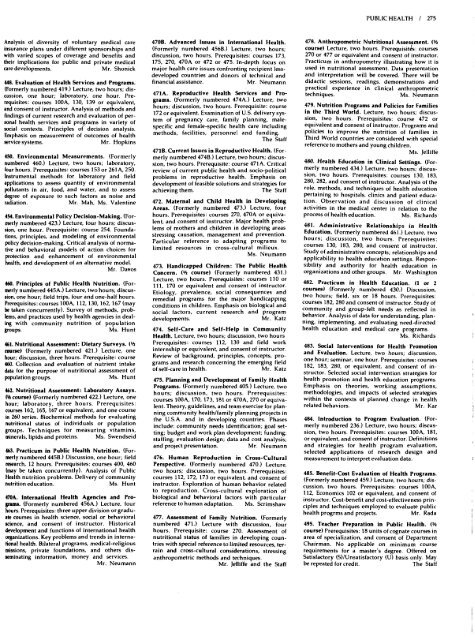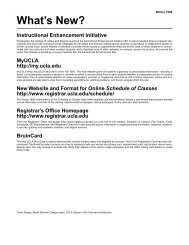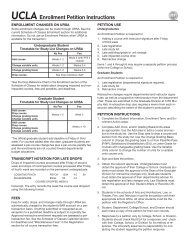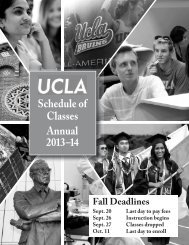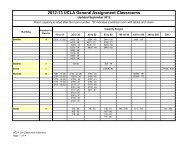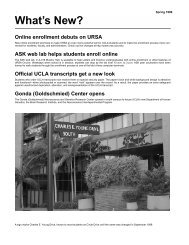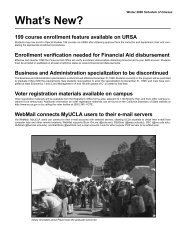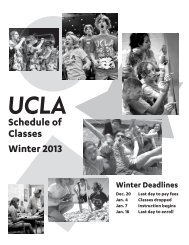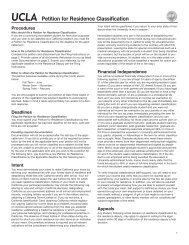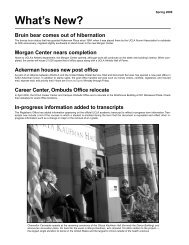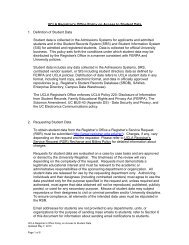UCLA Graduate Catalog 1980-81 - Registrar - UCLA
UCLA Graduate Catalog 1980-81 - Registrar - UCLA
UCLA Graduate Catalog 1980-81 - Registrar - UCLA
You also want an ePaper? Increase the reach of your titles
YUMPU automatically turns print PDFs into web optimized ePapers that Google loves.
Analysis of diversity of voluntary medical care<br />
insurance plans under different sponsorships and<br />
with varied scopes of coverage and benefits and<br />
their implications for public and private medical<br />
care developments. Mr. Shonick<br />
448. Evaluation of Health Services and Programs.<br />
(Formerly numbered 419.) Lecture, two hours; discussion,<br />
one hour; laboratory, one hour. Prerequisites:<br />
courses 100A, 130, 139 or equivalent,<br />
and consent of instructor. Analysis of methods and<br />
findings of current research and evaluation of personal<br />
health services and programs in variety of<br />
social contexts. Principles of decision analysis.<br />
Emphasis on measurement of outcomes of health<br />
service systems. Mr. Hopkins<br />
450. Environmental Measurements . (Formerly<br />
numbered 460.) Lecture, two hours; laboratory,<br />
four hours. Prerequisites: courses 153 or 261A, 250.<br />
Instrumental methods for laboratory and field<br />
applications to assess quantity of environmental<br />
pollutants in air , food, and water, and to assess<br />
degree of exposure to such factors as noise and<br />
radiation . Mr. Mah, Ms. Valentine<br />
454. Environmental Policy Decision -Making. (Formerly<br />
numbered 423.) Lecture, four hours; discussion,<br />
one hour. Prerequisite: course 254. Foundations,<br />
principles, and modeling of environmental<br />
policy decision- making . Critical analysis of normative<br />
and behavioral models of action choices for<br />
protection and enhancement of environmental<br />
health, and development of an alternative model.<br />
Mr. Davos<br />
460. Principles of Public Health Nutrition. (Formerly<br />
numbered 445A.) Lecture, two hours; discussion,<br />
one hour ; field trips, four and one-half hours.<br />
Prerequisites : courses 100A, 112, 130, 162, 167 (may<br />
be taken concurrently). Survey of methods, problems,<br />
and practices used by health agencies in dealing<br />
with community nutrition of population<br />
groups. Ms. Hunt<br />
461. Nutritional Assessment : Dietary Surveys. (%<br />
course) (Formerly numbered 421.) Lecture, one<br />
hour; discussion, three hours. Prerequisite: course<br />
460. Collection and evaluation of nutrient intake<br />
data for the purpose of nutritional assessment of<br />
population groups. Ms. Hunt<br />
462. Nutritional Assessment : Laboratory Assays.<br />
(14 course) (Formerly numbered 422.) Lecture, one<br />
hour; laboratory, three hours. Prerequisites:<br />
courses 162, 165, 167 or equivalent, and one course<br />
in 260 series. Biochemical methods for evaluating<br />
nutritional status of individuals or population<br />
groups. Techniques for measuring vitamins,<br />
minerals, lipids and proteins. Ms. Swendseid<br />
463. Practicum in Public Health Nutrition. (Formerly<br />
numbered 445B.) Discussion, one hour; field<br />
research, 12 hours. Prerequisites: courses 400, 460<br />
(may be taken concurrently). Analysis of Public<br />
Health nutrition problems. Delivery of community<br />
nutrition education . Ms. Hunt<br />
470A. International Health Agencies and Programs.<br />
(Formerly numbered 456A.) Lecture, four<br />
hours. Prerequisites : three upper division or graduate<br />
courses in health science, social or behavioral<br />
science , and consent of instructor. Historical<br />
development and functions of international health<br />
organizations . Key problems and trends in international<br />
health . Bilateral programs , medical -religious<br />
missions, private foundations , and others disseminating<br />
information, money and services.<br />
Mr. Neumann<br />
470B. Advanced Issues in International Health.<br />
(Formerly numbered 456B.) Lecture, two hours;<br />
discussion, two hours. Prerequisites: courses 173,<br />
175, 270, 470A or 472 or 475. In-depth focus on<br />
major health care issues confronting recipient lessdeveloped<br />
countries and donors of technical and<br />
financial assistance. Mr. Neumann<br />
471A. Reproductive Health Services and Programs<br />
. (Formerly numbered 474A.) Lecture, two<br />
hours; discussion, two hours. Prerequisite: course<br />
172 or equivalent . Examination of U.S. delivery system<br />
of pregnancy care, family planning, malespecific<br />
and female-specific health care including<br />
methods, facilities, personnel and funding.<br />
The Staff<br />
471B . Current Issues in Reproductive Health. (Formerly<br />
numbered 4746.) Lecture, two hours; discussion<br />
, two hours. Prerequisite: course 471 A. Critical<br />
review of current public health and socio-political<br />
problems in reproductive health. Emphasis on<br />
development of feasible solutions and strategies for<br />
achieving them. The Staff<br />
472. Maternal and Child Health in Developing<br />
Areas. (Formerly numbered 473.) Lecture, four<br />
hours. Prerequisites: courses 270, 470A or equivalent,<br />
and consent of instructor. Major health problems<br />
of mothers and children in developing areas<br />
stressing causation, management and prevention.<br />
Particular reference to adapting programs to<br />
limited resources in cross-cultural milieux.<br />
Ms. Neumann<br />
473. Handicapped Children : The Public Health<br />
Concern . (f course ) (Formerly numbered 431.)<br />
Lecture, two hours. Prerequisites: courses 110 or<br />
111, 170 or equivalent and consent of instructor.<br />
Etiology, prevalence, social consequences and<br />
remedial programs for the major handicapping<br />
conditions in children. Emphasis on biological and<br />
social factors, current research and program<br />
developments. Mr. Katz<br />
474. Self - Care and Self-Help in Community<br />
Health . Lecture, two hours; discussion, two hours<br />
Prerequisites: courses 112, 130 and field work<br />
internship or equivalent, and consent of instructor.<br />
Review of background, principles, concepts, programs<br />
and research concerning the emerging field<br />
of self-care in health. Mr. Katz<br />
475. Planning and Development of Family Health<br />
Programs . (Formerly numbered 405.) Lecture, two<br />
hours; discussion, two hours. Prerequisites:<br />
courses 100A, 170, 173, 1<strong>81</strong> or 470A, 270 or equivalent.<br />
Theory, guidelines, and team exercise for planning<br />
community health/family planning projects in<br />
the U.S.A. and in developing countries. Phases<br />
include: community needs identification; goal setting<br />
; budget and work plan development; funding;<br />
staffing; evaluation design; data and cost analysis;<br />
and project presentation. Mr. Neumann<br />
476. Human Reproduction in Cross -Cultural<br />
Perspective. (Formerly numbered 470.) Lecture,<br />
two hours; discussion, two hours. Prerequisites:<br />
courses 112, 172, 173 or equivalent, and consent of<br />
instructor. Exploration of human behavior related<br />
to reproduction. Cross-cultural exploration of<br />
biological and behavioral factors with particular<br />
reference to human adaptation. Ms. Scrimshaw<br />
477. Assessment of Family Nutrition . (Formerly<br />
numbered 471.) Lecture with discussion, four<br />
hours . Prerequisite : course 270. Assessment of<br />
nutritional status of families in developing countries<br />
with special reference to limited resources, terrain<br />
and cross-cultural considerations , stressing<br />
anthropometric methods and techniques.<br />
Mr. Jelliffe and the Staff<br />
PUBLIC HEALTH / 275<br />
478. Anthropometric Nutritional Assessment. (44<br />
course) Lecture, two hours. Prerequisites: courses<br />
270 or 477 or equivalent and consent of instructor.<br />
Practicum in anthropometry illustrating how it is<br />
used in nutritional assessment . Data presentation<br />
and interpretation will be covered. There will be<br />
didactic sessions, readings, demonstrations and<br />
practical experience in clinical anthropometric<br />
techniques. Ms. Neumann<br />
479. Nutrition Programs and Policies for Families<br />
in the Third World. Lecture, two hours; discussion<br />
, two hours. Prerequisites: course 472 or<br />
equivalent and consent of instructor. Programs and<br />
policies to improve the nutrition of families in<br />
Third World countries are considered with special<br />
reference to mothers and young children.<br />
Ms. Jelliffe<br />
480. Health Education in Clinical Settings. (Formerly<br />
numbered 434.) Lecture, two hours; discussion,<br />
two hours. Prerequisites: courses 130, 183,<br />
280, 282, and consent of instructor. Analysis of the<br />
role, methods, and techniques of health education<br />
pertaining to hospitals, clinics and patient education.<br />
Observation and discussion of clinical<br />
activities in the medical center in relation to the<br />
process of health education. Ms. Richards<br />
4<strong>81</strong>. Administrative Relationships in Health<br />
Education . (Formerly numbered 461.) Lecture, two<br />
hours; discussion, two hours. Prerequisites:<br />
courses 130, 183, 280, and consent of instructor.<br />
Study of administrative concepts; relationships and<br />
applicability to health education settings. Responsibility<br />
and authority for health education in<br />
organizations and other groups. Mr. Washington<br />
482. Practicum in Health Education. (1 or 2<br />
courses ) (Formerly numbered 430.) Discussion,<br />
two hours; field, six or 18 hours. Prerequisites:<br />
courses 182, 280 and consent of instructor. Study of<br />
community and group-felt needs as reflected in<br />
behavior, Analysis of data for understanding, planning,<br />
implementing, and evaluating need-directed<br />
health education and medical care programs.<br />
Ms. Richards<br />
483. Social Interventions for Health Promotion<br />
and Evaluation . Lecture, two hours; discussion,<br />
one hour; seminar, one hour. Prerequisites: courses<br />
182, 183, 280, or equivalent, and consent of instructor.<br />
Selected social intervention strategies for<br />
health promotion and health education programs.<br />
Emphasis on theories, working assumptions,<br />
methodologies, and impacts of selected strategies<br />
within the contexts of planned change in health<br />
related behaviors. Mr. Kar<br />
484. Introduction to Program Evaluation. (Formerly<br />
numbered 236.) Lecture, two hours; discussion,<br />
two hours. Prerequisites: courses 100A, 1<strong>81</strong>,<br />
or equivalent, and consent of instructor. Definitions<br />
and strategies for health program evaluation,<br />
selected applications of research design and<br />
measurement to interpret evaluation data.<br />
485. Benefit -Cost Evaluation of Health Programs.<br />
(Formerly numbered 459.) Lecture, two hours; discussion,<br />
two hours. Prerequisites: courses 100A,<br />
112, Economics 102 or equivalent, and consent of<br />
instructor. Cost-benefit and cost-effectiveness principles<br />
and techniques employed to evaluate public<br />
health progrms and projects. Mr. Rada<br />
495. Teacher Preparation in Public Health. ('<br />
course) Prerequisites: 18 units of cognate courses in<br />
area of specialization, and consent of Department<br />
Chairman. No applicable on minimum course<br />
requirements for a master's degree. Offered on<br />
Satisfactory (S)/Unsatisfactory (U) basis only. May<br />
be repeated for credit. The Staff


